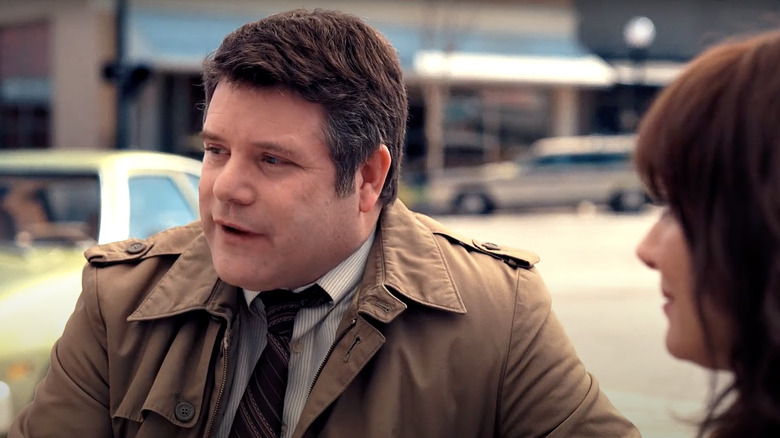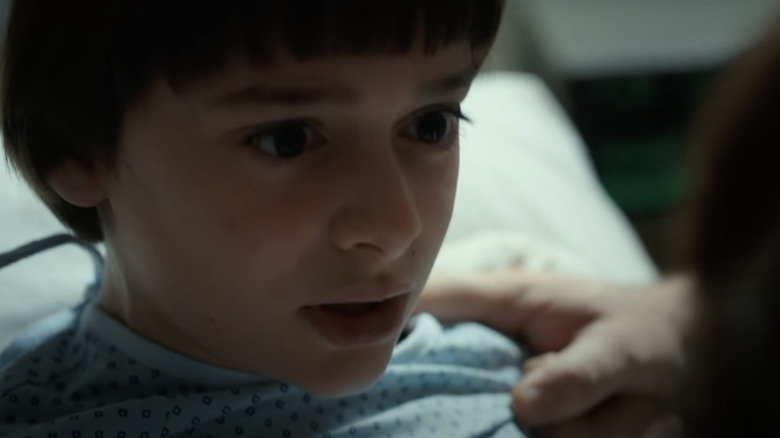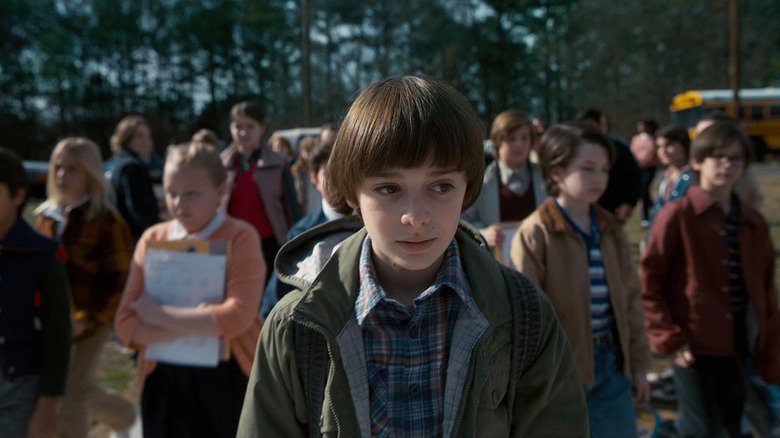Stranger Things Season 2 Nearly Had A Very Different Fate For Bob And Will
When it comes to romance, Joyce Byers (Winona Ryder) has lousy luck: her ex-husband only showed up to their son's funeral to collect financial compensation and she had to fight tooth-and-nail to break her not-boyfriend out of a Soviet prison. But it all pales in comparison to what writers originally planned for her in season 2, when her relationship with the ever-wholesome Bob Newby (Sean Astin) was tragically cut short.
It's been a while since season 2 came out, so if your memory is anything like mine, chances are that a few of the finer details are a little fuzzy. But there's one image that's permanently burned into my mind: Bob sacrificing himself to keep Joyce, Jim Hopper (David Harbour), Mike Wheeler (Finn Wolfhard), and Will Byers (Noah Schnapp) safe from an onslaught of demodogs. Little did we know that he would be part of a bigger trend of wholesome fan-favorite characters introduced and killed within the same season. Good people don't seem to stay alive in Hawkins.
Bob's death would have been devastating enough on its own, but it was made worse by the fact that the gang was already trapped in a high-stakes situation, running for their lives while trying to save Will from the Mind Flayer's control. Emotions understandably ran high, especially for Joyce. Nevertheless, Bob's gruesome death contained a small mercy: He was killed by supernatural monsters, rather than the possessed boy who would've become his step-son. The "Stranger Things" writers' room Twitter account recently revealed that the latter idea had been planned but scrapped. While the tweet didn't elaborate on why the idea was dropped (kindness? Practicality?), it likely would've been too dark for Will to come back from.
So much for the innocent little kid
As the seasons have progressed, "Stranger Things" has aged. The younger cast members have grown into teenagers and 20-something year olds, and the material too has become darker (regardless of circumstances, there's something deeply disturbing about a teenager admitting that she used to fantasize about her step-brother's death). But in the first couple of seasons, the show's younger characters were just little kids; "Stranger Things" was so compelling because viewers too were afraid of the unknown, seemingly unstoppable monster. And Will's disappearance was so concerning largely because a small, innocent child lacks the means to protect himself.
Will's possession in season 2 was a way to continue the first season's fear of the unknown — and to warn viewers that the doe-eyed little boy wouldn't be safe anywhere. After all, it's terrifying to think that the most vulnerable are just that — vulnerable — and everyone else is powerless to protect them. But if Will had killed Bob, a kind man who was en route to becoming his stepfather, his innocent persona would've been shattered. Sure, he would've been under the influence of the Mind Flayer, but how could the Duffer brothers really redeem Will afterwards? How could the audience forgive him?
Next steps would've been tough
We've already gotten a peek into how the Duffer brothers go about (trying to) redeem corrupted characters: Billy Hargrove (Dacre Montgomery) escaped the Mind Flayer's control and made the ultimate sacrifice, and even though Max Mayfield (Sadie Sink)'s dark fantasies about Billy were understandable after years of abuse, her guilt was the reason she would eventually become marked for death. But there wouldn't be a good way to redeem season 2's Will if he had murdered Bob. Death seems too harsh of a punishment for a child who was pulled into this whole mess involuntarily, while life brings its own curse — a little kid forced to live with the knowledge that he killed someone who cared about him.
The Duffer brothers have always had an eye on future seasons' plotlines, so they would've had to keep the problem of Will's corruption in mind when planning next steps. Since the early seasons of "Stranger Things" are all about childhood innocence, it might've been easier to simply nix the extra-dark turn and instead let the kids' innocence gradually slip away. After all, Bob's death was still deeply devastating. Why drag down an extra character needlessly?


